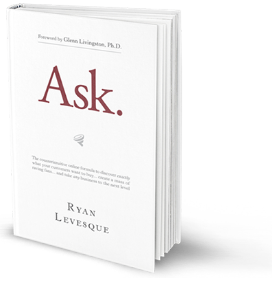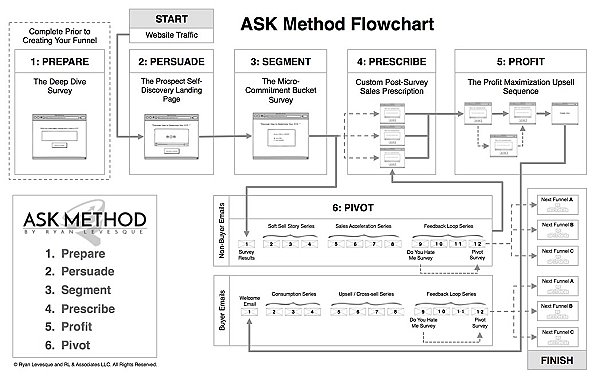How to Find Your Perfect Audience
 This post is a followup to Writing Content for a Website. In this post, we are going to cover a very new and counter-intuitive way that reveals how to find your perfect audience using surveys.
This post is a followup to Writing Content for a Website. In this post, we are going to cover a very new and counter-intuitive way that reveals how to find your perfect audience using surveys.
Content can also be used to rank higher in Google, Bing and Yahoo. For more on that, click here. The strategies of attracting people to your website and converting them are vastly different, but important.
You wouldn’t try to sell air-conditioners to eskimos, would you? It would not be as big a market as selling air-conditioning to residents of the United States or Central America. Conversley, you’ll sell more mukluks north of the Canadian border than you will south of the Mexican border.
How to Create Target Personas
You need to understand your perfect audience’s needs so that you can create content that will appeal to them. You will also use this information to effectively market to them!
There are almost always more than one target persona, marketing persona or avatar! To keep them straight, we often name them.
Think of your avatars as sketches or dossiers of your ideal prospects that show you how to find your perfect audience.
They would certainly include their primary and secondary challenges and the solutions you can offer them. There might be information about his or her job title or role. You might include demographic information, such as age (narrow or broad), gender, occupation, salary, location, education, values, personal interests, politics, religious affiliations, media consumed, etc. Anything that helps describe your perfect audiences, their needs and what differentiates them form each other.
There is almost always something you can learn about them to ultimately increase your conversions. (And your site traffic. More on that another day.)
“Understanding who your Target Personas are and what solutions they are looking for is a mandatory requirement for Website Success.”
A landscaper might create separate pages for lawn mowing, landscape design, tree removal, flower installation, pergola design and possibly snow removal. Content on each of those pages should be laser-focused and probably only linked to similar page content and blog posts.
A landscaper in Minnesota is going to offer some different services than one in Arizona and might use a different vernacular, whether describing flowers and plants native to the region or labeling the services offered.
The whole point of creating a Target Persona is to deliver content that will be relevant, useful and attractive to your audience.
We ask clients for seed keywords for content development and marketing purposes, but diving deeper can help even more!
Survey Says!
We worked with a client who specializes in mid-life dating for women. He surveyed his followers using a mix of multiple choice and open ended responses and the results were amazing and somewhat unexpected.
We’ll probably include some sort of survey for all new SEO or Editorial Calendar clients to our other market and competitive research efforts.
His survey was completed by hundreds of women and was even segregated by age groups. The responses by women aged 25-34 were different than women aged 45-54, and by asking them their age, we were able to zero in on the interests and needs of a specific age group, which contained multiple target personas, besides age.
We looked at the results of his survey to find seed queries that we could research to identify keywords and phrases for his blog’s editorial calendar. As anyone might guess, ‘online dating’ is one of the major interests of singles looking for a relationship, but we also found more specific related keywords, such as ‘finding love online’ or adding the word ‘secrets’ to their query.
We came up with 7 themes that came up frequently and listed all of the variations that the respondents used in their own words. Two of those themes had not been used by the client before and were more powerful than going with just gut reactions.
We found both long and short-tail keywords for each of those themes and began creating content around each of those Focus Keywords.
As beneficial as it was seeing his fans responses in their own words, there is a much more powerful way.
How to Find Your Perfect Audience Using Surveys
Ryan Levesque’s book Ask is about a formula of using 4 different surveys to find out what your prospects want and need, even if they don’t know what they want or need. Counter-intuitive? You bet.
But he shared 2 insights from men with amazing reputations for innovation, resulting in massive results…
“If I had asked people what they wanted, they would have said ‘faster horses.'”
Henry Ford
People did not ask for cars because they didn’t exist.
He also para-phrased Steve Jobs; “People don’t know what they want until you show it to them.”
Further, Levesque says people are much better at telling you what they don’t want. The Ask Formula (Aff link) is a unique combination of surveys in a very specific sequence and then acting on that data in a very specific way.

His method not only identifies what sub-segments exist in your market and which might appeal to your different target personas, but done right, finding out which ones are worth focusing on and contributing to your ROI.
Four Primary Surveys
The Deep Dive Survey is a foundational survey that the rest of the method depends on and is conducted once before you build out your online sales funnel. Basically, it’s an open-ended question asking what their single biggest challenge is. This question is all about learning as opposed to making money. Based on this survey, you begin to create your biggest categories or “buckets.” You may come up with 10 or 15 buckets, but ultimately you’ll combine similar buckets or reject lesser opportunities to narrow down to 3 or 4 buckets. This step alone will put you ahead many others online.
The Micro-Commitment Bucket Survey is a series of small, non-threatening, multiple choice questions, prior to asking them to make a commitment like giving you their name and email address. You use answers from this survey to put people in buckets and begin customizing your marketing and sales messaging. It also helps you define the products and services that you’re offering. Customizing your offers is a powerful win-win for you and your prospective customer, according to Levesque.
The “Do You Hate Me?” Survey sounds a little over-the-top, but it is usually presented in a lighthearted way. It is sent to people who did not buy your offer, especially when you’ve offered the best deals you can. People are surprisingly open in responding to the survey and give valuable insights on how to improve your sales messaging. Sometimes the survey finds that prospects just don’t understand your offer or it’s benefits.
The Pivot Survey is used to find out what your target audience might buy if they didn’t buy your original offer. Send this when your prospects who did not respond to revised offers or any of the multiple emails you have sent them. This allows you to pivot from one offer to something else.
The book goes on to talk about how to set up these surveys AND what happens between them.
So, if you’re asking how to find your perfect audience, create a massive following, take your business to the next level and become a top player in your industry; consider using the Ask Formula survey system in your sales funnel.
It might sound overwhelming, but I think the the return on your investment of time and resources will pay off.
We have begun implementing it for Web Asylum clients and I will report back on the results in a future post. In the meantime, I recommend buying Ask and learning how to implement it yourself. Buyers get access to bonus information online, including recommendations for the tools he uses to implement the Ask Method. I am hoping to interview Ryan on my upcoming podcast.
I believe this new way of learning how to find your perfect audience will vastly improve the online sales process and help you create better content. This method goes way beyond what your gut tells you. But even if you don’t implement it, I hope the ideas expressed in this post enlighten you.
And I’m curious, how have you defined your perfect audience? What kinds of market research or competitive analysis do you do? Please comment below!





